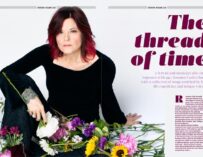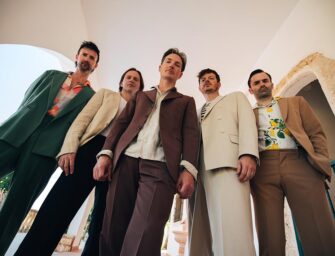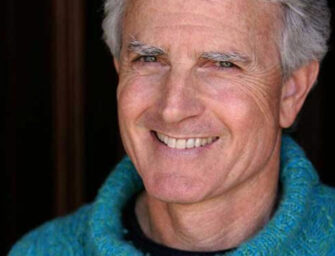
John: “If my dad drove a pickup truck and delivered chicken for a living, I’d still be going through his papers.” Pic: David McClister
Johnny Cash’s son talks to us about bringing his legendary father’s unpublished words to life on a star-studded new album
The iconic albums Johnny Cash made towards the end of his life with Rick Rubin highlighted the emotion and authenticity that he was able to bring to other people’s music, but perhaps diverted attention from his own songwriting. The 2016 posthumous publication Forever Words: The Unknown Poems not only revealed the exhaustive amount of material left behind by the ‘Man in Black’, it also helped to bring attention back to his enormous contribution to the world of lyrics and literature.
The natural progression was to turn these words into songs. Alongside co-producer Steve Berkowitz, John Carter Cash (Johnny’s son) invited musicians to create tracks from the treasure trove that had been discovered. Featuring family members Rosanne Cash and Carlene Carter, and legendary artists such as Elvis Costello, Brad Paisley and Alison Krauss, the album of the same title is further proof of the legacy and goodwill left behind by Johnny Cash. The record also features one of the last solo recordings by Chris Cornell, whose contribution You Never Knew My Mind takes on an even greater poignancy due to Cornell’s own tragic death last year.
We recently caught up with John Carter Cash to discuss the album and his father’s enduring place in the history of music…
How did you go about the task of sorting through all that material to select what you needed for this album?
“This whole project is about the words and it’s about the connection with my father. Going through his papers after he passed away, in his office tucked in crevices and in folders or old files, some in his safe, there were probably 2000 pieces of paper that were all handwritten. Some of them were biblical study notes and some were lyrics to songs that had been published, but there were 200 that weren’t. I had help with the research and determined that they had not been published before. We put these into a bound volume, sorted through them and carefully typed them out as best as possible, with some help from Steve Berkowitz and Paul Muldoon, the Pulitzer Prize-winning poet.
“With Muldoon and Penguin we put together the book of poetry, Forever Words. During that whole process I heard the possibility of music being added to some of these pieces, but it wasn’t essential then. The most important thing at that time was to reaffirm and establish my father’s strength as an American cultural literary figure. ‘Literary’ being the key word there, I saw the strength of the literary value of his work. The majority of folks know the iconic image of Johnny Cash or they connect with a song, but his strength as a writer was the focus.”

Johnny Cash. Pic: Don Hunstein
So you always saw the words as the beginnings of potential songs?
“I always did hear melodies there, most certainly, to a lot of the pieces. But the book was very important first. The album is a collection of my father’s word and that’s the consistent line through the project. My father has a very diverse fan base. Fans who own nothing but punk rock have the same Johnny Cash records in their collection as a fan of country gospel who owns no punk rock. Other artists respect for my father is also across the board, genre-wise.
“So the question was, who loves my father the most, or who has it within their heart or within that love that they feel capable of taking this on? It may not be something that an artist would do or maybe it would be something that they would enjoy. Most painters don’t paint with other people’s paints, but each artist was handed the paints and the palette and then they did what they would with the music. I didn’t try to direct anything and neither did Steve Berkowitz. I did give them the freedom to do edits if it was necessary for the song and what they were creating – I think my father would have done the same. He was very open-minded musically.
“Within his own record collection he would listen to American black gospel music before 1950 and that’s about all, but when he was studying for one of his albums he would listen to everything and artists all across the board were influenced by my father.”
Did you give them the specific lyrics or did they get to pick?
“Most artists saw two to three pieces and picked. Rosanne saw more and Carlene too. I also pointed out The Walking Wounded to Rosanne and said, ‘This one, Rose,’ because it’s something that I knew she could believe in and relate to and would intuitively speak out for. It’s about post-traumatic stress. Dad wrote it focussing on what was happening with the veterans of the Vietnam War but it connects through to everybody. It depended on the artist and who it was, but I did a lot study with Steve Berkowitz on what would work for what artist.”
And did you personally record all the artists?
“I recorded most of the stuff, except for five or six tracks. I produced it at the Cash Cabin Studio in Hendersonville, Tennessee, which is where my father did a lot of his latter-day recordings on the Rick Rubin projects, and where I recorded with my father all those years ago. I was there for every session from American III until the end of Dad’s life.
“I tried to put the frame around the song instead of building the song and the frame. The essential thing was the words, I didn’t want to direct an artist and say, ‘Let’s write it like it’s a Johnny Cash song.’ I wanted them to have their own freedom and follow their heart so that it’s honest and true to their artistry. If the artist was like, ‘Hey I connect with this as if your dad is in the room and we were going to sing it together,’ then that was fine too.

Johnny Cash. John Carter Cash: “My dad was my best friend when I was young.” Pic: Don Hunstein
Was that something which happened a lot?
“There’s two like that on the album, the T Bone Burnett track and the John Mellencamp track and they work wonderfully. I gave I’m With Her a few pieces to look at and I didn’t think they’d pick Chinky Pin Hill but they did, and wow. As far as production, sometimes there was more to be done, but with those girls they just do what they do and you just set up the microphones. I watched Jamey Johnson write Spirit Rider spontaneously. He looked down at the words, he had his guitar in his hands and the song just came out. I happened to be recording and what you hear is the way it came out, except one verse got moved. Also Gold All Over The Ground, I just happened to be recording the first time Brad Paisley saw the lyric.”
What you were feeling as you watched those artists create music with your dad’s words?
“It was wonderful to see them connect with an artist that I respect like my father. I respect my father’s artistry and music independently, in a scholarly fashion, and also respect the artists that I’m bringing it too and love their music. Then there’s also the fact that they’re my dad’s words and they connect so strongly with my father on a more personal level. It was exciting and it was thrilling. I love creativity, being in the midst of it and watching people be creative and capturing it.
“The experience varied with each song. I’ll Still Love You by Elvis Costello was one of the tracks that I wasn’t there for, it just depended on what it was. I invited everybody to come to the cabin but sometimes they couldn’t make it. I was there when Goin’, Goin’, Gone began. Robert Glasper started writing the music with Anu Sun and that was a lot of fun and it’s actually the one place that you can hear me on the album, that’s me whispering. It’s across the board as far as genres go, but they all love Johnny Cash and that’s what makes it work, an honest love for my father and his music.”

Johnny Cash. Pic: Don Hunstein
You Never Knew My Mind, the Chris Cornell track, must take on an even greater level of significance now?
“I know where Chris was when he wrote that song, he was in a very good space. He recorded it in early 2016 and had written it not too long before that. It almost made me cry the first time that I heard it, it chilled me to the bone. That was the demo that he sent to me on an email and then mixing it after he passed away was pretty heavy. It still is overwhelming because Chris and I developed a camaraderie through the whole process. We talked about different things. He went fishing with his dad when he was a boy, I did also, so we talked about those fishing trip. We talked about him travelling on the road with his children because my dad travelled with me all the time when I was young. We connected and I miss the guy. He was a gentle, loving and humble man. I thought he would be very intense but he was so soft-spoken and kind and he just had a very gentle heart, but was tortured. My father was likewise. That emptiness that you feel in that song was something that my father expressed a lot in music, like with Hurt.”
What effect has this process had on your relationship with your dad?
“I’m 48 now and I’m seeing through a different pair of glasses. His words touch my heart differently now, I’ve had different experiences since he passed away. It’s a communication, it’s spending time with my best friend again. My dad was my best friend when I was young. We worked together, we laughed together, we struggled through things together. We went through a lot and it’s sort of like encountering him again. I talk more about him than I think the average person would his father who has passed on, but it’s given me a chance to go through a healing and a catharsis at the same time. It’s been a wonderful experience, it’s been a journey. But I’ve produced music other than this type of thing. I’ve produced over 105 songs for Loretta Lynn and I’ve got my own album coming out soon, We Must Believe In Magic. I have to have a balance.
“It’s such a wonderful thing to have the chance to encounter my father again through his words and be reminded of everything that he was and who he was. If my dad drove a pickup truck and delivered chicken for a living, I would still be going through his papers.”
Lastly, what do you think his legacy is?
“I’m just going to go with what Dad said. Larry King asked him on live television, ‘If you could be remembered as one thing after you pass away, what would be the most important thing?’ and Dad just didn’t skip a beat and said, ‘A good father,’ and in that he was successful but I think his legacy can be what we choose for it to be. To me I like to focus on the light and the good and the beauty. The darkness is there, the struggle and the emptiness, but I hope to always bring to mind the good things and spread the word about the strength, love and light that endures. Yes there were struggles, yes he fell short and had addictions, but there’s so much hope and that’s what this album is about, hope.”
Interview: Duncan Haskell
Johnny Cash: Forever Words is out now at johnnycash.lnk.to



































Related Articles